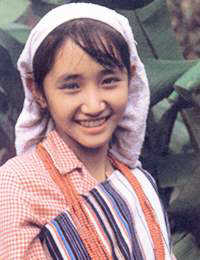 The Drung is one of the smallest ethnic minority in China. With a total population of about 5,816 (as of 1990), the Drungs mainly live in the Drung River valley in the Gongshan Drung and Nu Autonomous County in northwestern Yunnan Province.
The Drung is one of the smallest ethnic minority in China. With a total population of about 5,816 (as of 1990), the Drungs mainly live in the Drung River valley in the Gongshan Drung and Nu Autonomous County in northwestern Yunnan Province.
Their language belongs to the Tibeto-Burman Austronesian of the Chinese-Tibetan Phylum. It does not have a written form and, traditionally, records were made and messages transmitted by engraving notches in wood and tying knots.
Few historical records were found regarding the origin of this ethnic minority. But relative references show that they were once under the rule of court-appointed Naxi headmen through the Yuan Dynasty (1271-1368) to the end of the Qing Dynasty (1644-1911). They had no uniform name and were called Qiao in the Yuan Dynasty and Qiu or Qu in the Qing Dynasty. With the founding of the PRC in 1949, following consultation with the ethnic minority, it was decided to agree upon the official name of Drung ethnic minority.
The Drungs are chiefly involved in agriculture, with fishery and hunting as their sidelines. The Drung people are brave, industrious, united and generous. They are well known as a nation with good credibility and morality. They never lock their doors when they go out. They store the harvested grain on slopes far away from home. In order to lighten the burden when they trudge over long distances, they usually hang their haversacks for the return journey from the branch of a tree. No one will touch others' belongings. Although the society is ruled by some simple disciplines, no thefts or crimes occur within the ethnic minority.
The Drungs are animists and believe that all living creatures have souls. Believing evil spirits exist everywhere and can bring calamities to people, they often hold various rites to expel evil sprits. Now, some Drungs are believers of Christianity.
The Kaquewa Festival is the only New Year festival of the Drung ethnic minority. It is held during the eleventh and twelfth lunar months. The exact date varies with the location, and the celebration often lasts as long as the food does. The most ceremonious activity during the festival is killing and sacrificing an ox.
The Drung women also have the tradition of tattooing their faces at the onset of puberty, with the patterns varying according to the clan.
